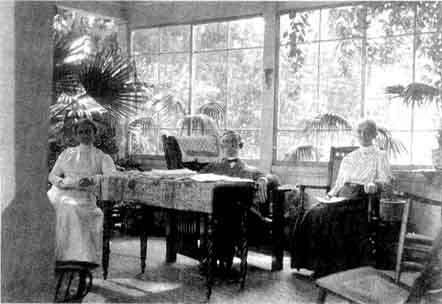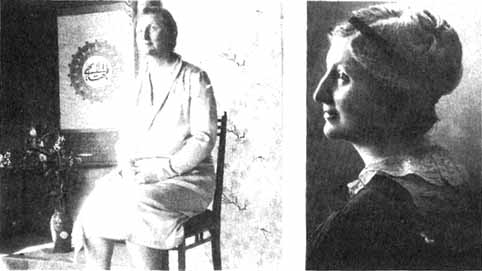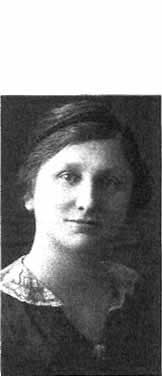
|
Traces That Remain:
A Pictorial History of the Early Days of the Bahá'í Faith among the Japanese
by Barbara R. Sims
edited by Sheridan Sims  |
chapter 5 | start page | single page | chapter 7 |  |
Chapter 6
The single person who has had the most profound influence upon the spiritual destiny of the Japanese people has been Miss

click here for larger image
Miss Alexander with her mother and father in their comfortable home in Hawaii in the early 1900s.
Agnes Alexander. The Guardian wrote to her (1933), "Your name will forever remain associated with the rise of the Faith and its establishment in Japan and the record of your incessant and splendid endeavors will shed on its annals a lustre that time can never dim."
Miss Alexander was raised in the late 1800s in Hawaii in a prosperous family. Her grandfather was one of the first Christian missionaries to Hawaii and she was a devout Christian in those early years.

click here for larger image
Hand of the Cause Miss Agnes B. Alexander, 1875-1971. Miss Alexander as she looked in 1900 about the time she accepted the Faith. She received over a dozen Tablets from 'Abdu'l-Bahá. He called her the Herald of Truth in Japan and said she would be confirmed, assisted and exalted. He wrote, "...the doors of the Kingdom of God are open..." "...In such a time patience and tranquility are not allowable."

| Miss Alexander enjoys the garden of the Imperial Hotel in Tokyo, 1919. | In the Japanese kimono. |

In the front room of her house in Sakura, Tokyo, Christmas 1930.
 |

|
| Daughter of the Kingdom! | Miss Alexander liked cats. |
In 1900, when she was twenty-five years old she heard of the Faith in Italy, where she had gone to visit a relative. She went to Paris afterward and stayed several months studying the newly accepted Faith with some of the very early Bahá'ís, among them Miss May Bolles (later Mrs. Maxwell.)
Miss Alexander then returned to her home in Honolulu, Hawaii. She was the first Bahá'í in the Pacific area. She taught her friends, and a firm foundation was soon laid for the Faith in that land.
Miss Alexander said even in those days she had an interest in Japan. In the early 1900s she attended a lecture in Honolulu given by Mrs. Ume Tsuda, founder of Tsuda College in Tokyo, a famous private school for women. She took notes on the interesting lecture and from then on wanted to visit far-off Japan.
After she became a Bahá'í, Miss Alexander wrote occasionally to 'Abdu'l-Bahá. He favored her with several Tablets. In two of them He suggested that she go to Japan but wrote that she was free to decide. She had such deep faith that she felt she must do as 'Abdu'l-Bahá wished. It was in 1914 that she finally
Another American Bahá'í had arrived in Tokyo a few months before, Dr. George Augur. He and Miss Alexander started discussion groups. Their efforts were to have far-reaching effects. As Miss Alexander gradually made Japanese friends, she would encourage those who were attracted to the Faith to write to 'Abdu'l-Bahá. He always answered. It is a blessing forever for the Japanese people that because of Miss Alexander's efforts we have copies of eighteen Tablets from 'Abdu'l-Bahá written to the Japanese, and one to Koreans. Korea was under Japanese rule at that time.
 |
chapter 5 | start page | single page | chapter 7 |  |
|
|